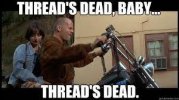
You are using an out of date browser. It may not display this or other websites correctly.
You should upgrade or use an alternative browser.
You should upgrade or use an alternative browser.
Can you stop play if a player seems to be injured and lying down on the floor?
- Thread starter newref
- Start date
- Status
- Not open for further replies.
"Head injury" or "it's not a head injury so why did you stop?" is one of those things that we hear all the time but isn't quite right in law. Your top priority is player safety, so stopping play for any potentially serious injury is definitely the best practice.
Guidance suggests that any head injury should generally be assumed to be serious, but that's not intended as an exhaustive list and does still allow discretion if it's a very minor knock to the head.
Guidance suggests that any head injury should generally be assumed to be serious, but that's not intended as an exhaustive list and does still allow discretion if it's a very minor knock to the head.
Like above stop play.
If you get any complaints from the opposition say 'I'd be stopping play for one of your guys if he looked badly injured too'
If you get any complaints from the opposition say 'I'd be stopping play for one of your guys if he looked badly injured too'
one
RefChat Addict
Also as above.
My addition. What you should consider serious is lowered when you get into the the lower age groups. Generally speaking, many cases of injuries which would not be considered serious in adult games, would be considered serious in the lower ages of youth games (U9-U12 for example).
The reason 'head injury' is mentioned specifically in some guidelines is because head injuries are almost always serious, youth or adults.
My addition. What you should consider serious is lowered when you get into the the lower age groups. Generally speaking, many cases of injuries which would not be considered serious in adult games, would be considered serious in the lower ages of youth games (U9-U12 for example).
The reason 'head injury' is mentioned specifically in some guidelines is because head injuries are almost always serious, youth or adults.
The Laws for once answer your question word for word. They quite clearly state that the referee: "stops play if a player is seriously injured".If a player appears to be seriously injured (but NOT head injury) and laying in the floor. Can play be stopped whilst the ball is in play? If so can it be stopped whilst the opposing team has a potential attack? Or must it be stopped after the attack has finished?
It's difficult as unfortunately more and more players are going down faking serious injury only to pop straight back up again once you've stopped play. But you don't really have an option, and having a better idea of whether a player is seriously injured or not will come from experience. Reaction of team mate often helps as they will know what he is like and react accordingly. But all you can really do is stop play if there is any doubt it is serious.
Justylove
RefChat Addict
Exactly, often you'll see players down holding their heads, when they actually get treatment, it's for an ankle injury...It's difficult as unfortunately more and more players are going down faking serious injury only to pop straight back up again once you've stopped play. But you don't really have an option, and having a better idea of whether a player is seriously injured or not will come from experience. Reaction of team mate often helps as they will know what he is like and react accordingly. But all you can really do is stop play if there is any doubt it is serious.
The one time you ignore it though it'll be a serious injury. 

Justylove
RefChat Addict
The one time you ignore it though it'll be a serious injury.
I found as I have got more experienced and more able to keep a trailing eye on play, you can quite easily see identify by how the injured player goes to ground as to how whether you need to stop play immediately or can continue. Also if play is in a neutral position then you can think about stopping it.
Worst case as a ref is that you think it’s serious, you stop play as a team (usually the opposing team to the injured player) is surging forward on the attack, you stop it and the injured player proves not to be as badly hurt as you thought!
Xavier
Member
How would you stop the play how many times would you blow the whistle if the ball is in play?If someone appears to be seriously injured stop play wherever the ball is and get them treatment.
There's nothing in the laws about waiting for an attack to end before stopping play in any instance
- Status
- Not open for further replies.


